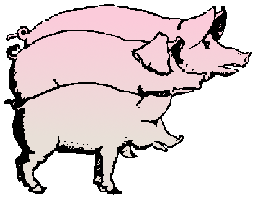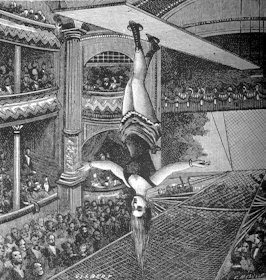Educated Pigs
Today, creative genius satisfies our need to be amazed. The University of Houston's College of Engineering presents this series about the machines that make our civilization run, and the people whose ingenuity created them.
Ricky Jay's book, Learned Pigs and Fireproof Women, gives a marvelous account of the inventors of yesterday's trickery. In it he explores the great stage tricks of past centuries.
Well, not just tricks -- much of it is better than trickery. In 1900, for example, a magician waved his wand over a 2½-foot ball, and it rolled uphill on a ramp. No magnets, no electricity.
In the ball, it seems, rode a contortionist who kept its weight off-center. The skill needed to do that was enough to make the exposed trick more remarkable than the secret trick.
A lot of the old stage trickery was like that. One man gained such control over his joints and muscles that he could make himself shrink or grow six inches in seconds. Now that was a frightening thing to see.
Down through history a whole class of tricks has used assaults on the human body that I'd as soon not have to watch. A human fountain drank 40 glasses of water, then spouted it into a container 20 feet away. Sword swallowers, stone eaters, fire walkers. Several people did tricks with their own flatulence.
Many of the great 19th-century stage wonders were handicapped people who'd simply overcome their handicaps -- an armless violinist who played with his feet. Sarah Biffin, born without arms or feet, became a fine artist. She held the brush in her teeth, and I tell you, her work was good. Blind Tom, born as a sightless slave, went on to become a great stage hall musician.
I like the educated pigs best. Pigs are very smart animals. In 1783, a trained pig turned up in London doing acrobatics and arithmetic -- singing and playing cards. Never mind which acts were real and which were fake -- this was a very bright beast. Blake, Coleridge, Wollstonecraft, and Samuel Johnson all visited him. When Johnson died soon after, a poem turned up,
Though Johnson, learned BEAR is gone,
Let us no longer mourn our loss;
For lo, a learned Hog is come,
And Wisdom grunts at Charing Cross.
 For a while, pigs were the rage. But young pigs soon grew too big for the stage. One showman brought in a set of new young pigs and let the old pigs help train them. When the huge old pigs, off in their sty, heard their musical cue, they burst loose, ran to the stage, and pushed the young newcomers aside.
For a while, pigs were the rage. But young pigs soon grew too big for the stage. One showman brought in a set of new young pigs and let the old pigs help train them. When the huge old pigs, off in their sty, heard their musical cue, they burst loose, ran to the stage, and pushed the young newcomers aside.
And so, for a season, creativity satisfied our need for wonders by directly outrunning what we thought were human and animal limits. Finally new technologies -- first movies, then TV -- simply overshadowed the old stage trickery. They raised our expectations far beyond anything we'd ever seen on the stage. And an era of wonders ended at last.
I'm John Lienhard, at the University of Houston, where we're interested in the way inventive minds work.
(Theme music)
Jay, R., Learned Pigs and Fireproof Women. New York: Villard Books, 1986. (My thanks to Sims McCutchan for supplying this text.)

clipart